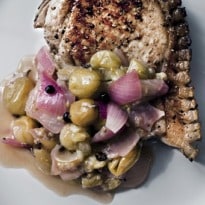The three little pigs I got to know last summer grew like topsy, and were ready for the oven by early July. I had watched them grow, filmed and photographed them, hugged them and tickled them. I played football with them, for heaven's sake (they always won). But at no time did I ever think of them as anything other than crackling-in-waiting. I shed no tears when they waddled off to slaughter.
The richness of pork makes it a winter meat: the wobbly fat and crisp skin just the job for a cold, wet night. But that richness also begs to be married to bright, sharp summer flavours, too - the tartness of green gooseberries or pale-pink rhubarb, the bitter leaves of watercress and the sweetness of freshly picked peas. It's too good for the winter kitchen alone.
We have had pork twice this week, first as lightly cooked tenderloin in a vegetable stock with peas, beans and asparagus, the liquid enriched by the pork cooking juices. And then, two days later with a relish of gooseberries and mint, as tart as an unripe Bramley apple. On both occasions we cooked the pork on the rare side, resulting in a lighter-tasting meat than the slow-cooked recipes that are more appropriate in colder weather.
Pork chops are good on a barbecue because the fat prevents them from drying out. The downside of cooking chops on a barbecue is the clouds of smoke the fat makes as it drops into the coals, but crikey is the result good to eat. You need something to make them sing and that can, of course, be a classic apple sauce, but much better I think is to take the gooseberry route, cooking the fruit with just the smallest amount of sugar and onion. Go for a sharp green variety rather than the purple dessert type that lack the punch you need. Fresh summer sharpness for a rich meat.
Pork chops, gooseberry, mint and juniper relish
Serves 4
red onions 2
olive oil 3 tbsp
juniper berries 8
gooseberries 500g
honey 2 tbsp
mint leaves 10, medium sized
pork chops 4
Peel and roughly chop the red onions, put them in a deep pan with the olive oil and leave to cook slowly, without any browning, until soft and tender.
Coarsely crush the juniper berries using a pestle and mortar. Wash the gooseberries, top and tail them and tip them into a saucepan with the crushed juniper berries, honey and a couple of tablespoons of water. Put the pan over a medium heat and bring to the boil, lower the heat and let the fruit stew for 10-12 minutes till the berries start to burst. It would be good to catch them before they start to collapse into jam.
Shred the mint leaves, stir them into the gooseberries and turn off the heat. Leave the fruit to settle and cool for 10 minutes or more before serving. If you plan to serve the relish cold, then chill thoroughly before serving. If you are serving it warm, keep it in a warm place, covered, until the chops are ready.
Using a very sharp knife, score the fat of the chops, going through the fat to the flesh. This will help it crisp nicely on the grill. Rub the chops lightly with olive oil then season with salt and black pepper. Set the chops over the barbecue or on a preheated griddle pan and cook, depending on their thickness, for 5 or 6 minutes, turn, then cook the other side for a further 5. The fat should be golden and lightly crisp, the pork slightly pink and very juicy within.
Serve the relish, warm or chilled, alongside the chops.
Pork fillet with summer vegetables
The peas and the asparagus can be cooked in the same water, but I recommend that you cook the beans separately.
Serves 4
pork tenderloin 500g
broad beans 150g (podded weight)
peas 250g (podded weight)
asparagus 10 medium to thin spears
spring onions 6, thin
vegetable stock 400ml
lemon juice a squeeze
Boil the beans in lightly salted water for 5-7 minutes until almost tender, drain and skin if you wish. If they are very small and young, you can leave the skins on. Drop them into a bowl of iced water. Slice the asparagus into short lengths and cook in fresh boiling water, then remove with a draining spoon and drop them into the cold water with the beans. Cook the peas, in the asparagus water, for 4 or 5 minutes until tender, then drain and add to the chilled water. Trim and roughly chop the spring onions.
Season the pork with salt and pepper. Warm a little oil in a shallow pan, add the pork and cook for 10 minutes, turning regularly so it cooks evenly. Remove the pork from the roasting tin and set aside, covered with foil, to rest. The inside should be pale pink and juicy.
Put a shallow pan over a moderate heat, add the spring onions and let them cook for a minute or two, until they have softened slightly and darkened in colour. Add the vegetable stock and bring to the boil. Stir well, scraping at any cooking juices stuck to the pan, and letting them dissolve in the stock.
Season with salt and pepper, then add the cooked beans, asparagus and peas. Return the pork to the pan for 3 or 4 minutes, letting it cook with the stock and vegetables, then ladle the liquid and greens into shallow soup or pasta bowls.
Slice the pork thickly, and divide between the bowls. Scatter over a little sea salt and serve.
Email Nigel at nigel.slater@observer.co.uk. Follow Nigel on Twitter @NigelSlater
Sharp shooters: Nigel Slater's pork chops, gooseberry, mint and juniper relish recipe. Photograph: Jonathan Lovekin for the Observer








